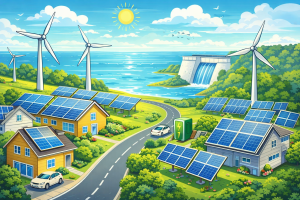Jakarta—The Institute for Essential Services Reform (IESR) has sharply criticised the government’s plan to reduce the renewable energy mix target from 23 per cent to 17-19 per cent by 2025. According to the organisation, the move not only hampers efforts to reduce carbon emissions but also threatens the growth of a low-carbon economy in Indonesia.
According to IESR, the failure to achieve the renewable energy mix target in the last five years should be the basis of evaluation for a better strategy, not an excuse to lower the target. IESR Green Economy Program Manager Wira A Swadana noted that renewable energy has become cheaper.
“Solar panel prices fell 89 per cent from 2010 to 2019, wind turbines fell 59 per cent, and battery storage fell 89 per cent,” he said in a written statement Friday, June 28.
Swadana also emphasised that maintaining coal’s dominance in Indonesia’s energy system would create economic vulnerabilities. “Indonesia’s coal export destinations, such as China and India, have set carbon-neutral targets and will significantly reduce coal consumption,” he said.
Projections show that if these countries fulfil their climate commitments, Indonesia’s coal demand could decline by more than 90 per cent by 2050 compared to 2020.
Strategies for renewable energy
IESR proposes two main strategies to achieve the renewable energy mix target. First, a supporting law for the energy transition ecosystem must be created. Second, PLN’s sustainable finance framework should be improved to encourage more sources of financing.
“Just as PLN’s business model must change, so must regions comprehensively change their energy systems,” said Swadana.
The central and local governments need to understand all elements of the energy system, including electricity, transportation, and related sectors. Wira added that in addition to the technical side, the government also needs to pay attention to the social and economic impacts of the energy transition. For example, the reduced use of coal will affect the economy of coal-producing regions.
Meanwhile, Djoko Siswanto, Secretary General of the National Energy Council (DEN), explained that the renewal of the PP KEN is based on more realistic macroeconomic considerations. “The renewable energy mix until 2030 is targeted at 19-22 per cent, will increase in 2040 to 36-40 per cent, and increase in 2060 to 70-72 per cent,” he explained.
Siswanto added that carbon emissions from the energy sector are expected to fall to 129 million tons of carbon dioxide equivalent by 2060, which will be absorbed by forestry and other sectors. (Hartatik)














